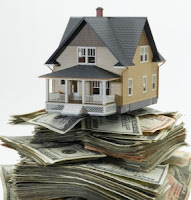by on May 29, 2011


Top Performer Award Recipient
Allen Tate Realtors
Tel. 704.953.0183
e mail: joe.naccarato@allentate.com
Do you know someone buying or selling anywhere? I can help them! Please give them my phone number!





“11 percent of Realtors® report a contract was cancelled in April from an appraisal coming in below the price negotiated between a buyer and seller, 10 percent had a contract delayed, and 14 percent said a contract was renegotiated to a lower sales price as a result of a low appraisal.”One out of four real estate transactions was either cancelled (11%) or renegotiated to a lower sales price (14%) because of a low appraisal!!























For the affected borrowers, because mortgage rates for jumbo mortgages tend to be higher than rates for conforming loans, financing costs may be higher… Over the latest year, the difference between mortgage rates for jumbo loans and jumbo-conforming mortgages has varied between about ½ and ¾ of a percentage point.Just a ½ point increase in mortgage rate on a $500,000 mortgage means an additional $154.84 in your monthly mortgage payment; a difference greater than $55,000 over the life of a 30 year mortgage.





To date, attitudes about owning have become only slightly more negative while attitudes about whether now is a good time to buy are little different than before the housing boom. In the latest Fannie Mae housing survey from October–December 2010, the vast majority of respondents—including renters—continued to believe that homeownership makes more financial sense than renting. In addition, nearly two-thirds of all renters surveyed reported their intention to buy homes in the future.
In addition, renters have only a fraction of the net wealth of owners. Near the peak of the housing bubble in 2007, the median net wealth of homeowners was $234,600—about 46 times the $5,100 median for renters. Even if homeowner wealth fell back to 1995 levels, it would still be 27.5 times the median for renters.The recent fall in prices can’t wipe out the 100 year history housing has as a good long-term investment.
“And for individuals as well as businesses, owning rental properties is an avenue for wealth creation.”And how do these individuals and businesses create that wealth. Owning the real estate and collecting rent from their tenants to offset the mortgage payments. Build your family’s wealth – not your landlord’s. We believe OWNERSHIP almost always makes the most sense.




“Recent developments in issues such as GSE reform, Dodd-Frank securitization rules, and foreclosure settlement issues suggest a tighter and more expensive environment for mortgage credit.”This may impact any potential purchaser for your property and may also impact your next purchase.


